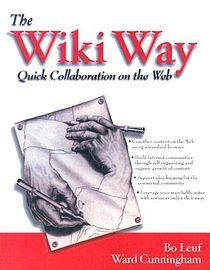 | |
| Author | Bo Leuf Ward Cunningham |
|---|---|
| Publisher | Addison-Wesley |
Publication date | April 3, 2001 |
| ISBN | 0-201-71499-X |
The Wiki Way: Quick Collaboration on the Web is a 2001 book about wikis by Bo Leuf and Ward Cunningham. [1] [2]
Contents
It was the first major book published about using wikis.[ citation needed ] Cunningham invented wikis when he wrote WikiWikiWeb, the first wiki website software.[ citation needed ]
The book is about how to manage wiki systems, followed by a perspective on the nature of wiki-style online communication.